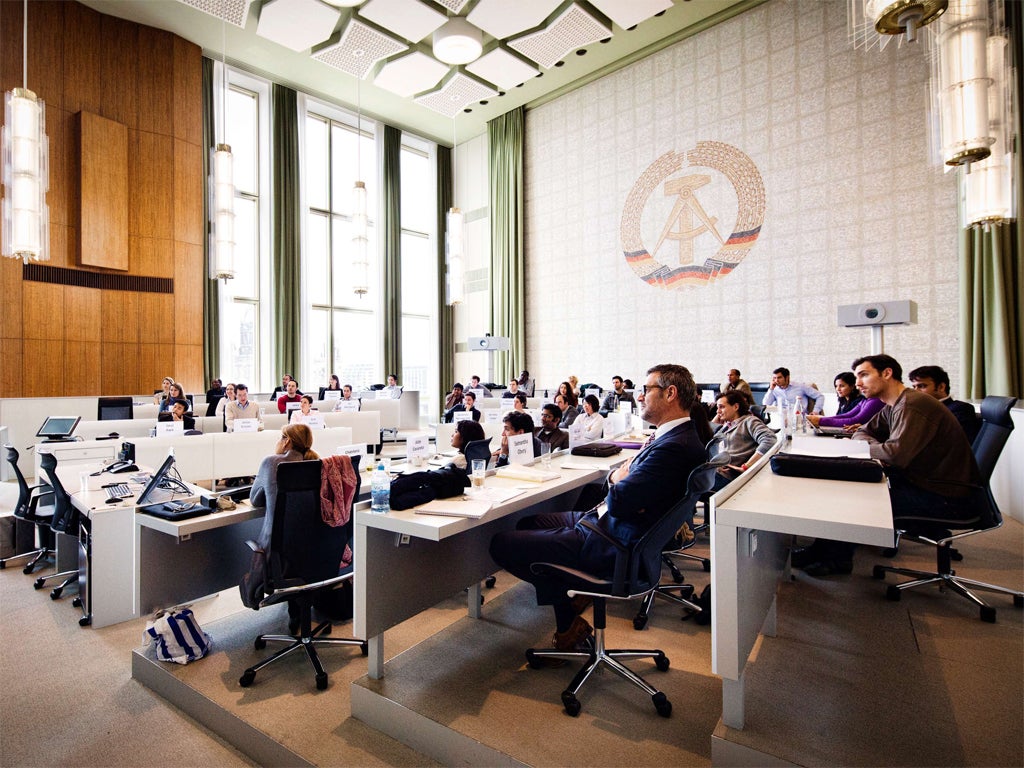Germany: The MBA powerhouse of Europe
Business schools in Germany are climbing up the international rankings fast

European MBA rankings are dominated by a small cadre of business schools. The popularity of institutions such as LBS, Insead, HEC, Rotterdam School of Management and Instituto de Empresa is evidence that the UK, France and Spain take management education very seriously. So why isn't Germany, arguably Europe's foremost industrial power, currently at the top table?
A German MBA is about to set the record straight. As the Berlin-based European School of Management and Technology (ESMT) heads for its 10th anniversary, its full-time and executive MBA will soon be eligible to enter the Financial Times' rankings. The private business school is funded by a consortium of 25 of Germany's biggest multinational companies, including Allianz, Daimler-Benz, Siemens, Bosch, BMW and Deutsche Bank. It is already ranked ninth in Europe and 16th in the world for executive education by the Financial Times. ESMT's full-time and executive MBA are now set to prove their strength too.
The MBA is a relative newcomer in Germany, partly due to the fact that managers there are already among the most highly educated in the world. But the competition for global talent and the emergence of a global executive elite has made the acceptance of the qualification inevitable.
ESMT's executive MBA is designed to cater for the needs of executives at top international companies, based mainly in Germany, and 80 per cent of which sponsor their employees to undertake the course. The business school also attracts students from Russia and the former Eastern bloc. ESMT's latest corporate sponsor is the Russian energy giant Gazprom. "Berlin is at the heart of Europe and the eurozone, but it is also a bridge between East and West. We are only 50 miles from the border with Poland. If any international student wants to experience what it is like to be at the heart of Europe then where better to study than with us," says Jörg Rocholl, the president of ESMT.
ESMT has 40 students on its one year full-time MBA programme and 50 on its executive MBA, which is taught over 18 months. Students come from across Germany, Europe and around the world. Since East and West were reunified in 1990, Berlin has become the political and cultural hub of the new German republic. Parliament and all of the government ministries are based in Berlin and young technology businesses are a growth sector. "We specialise in international management for technology and industry," says Nick Barniville, director of the MBA programme at the school.
Berlin is a young city in both the age of its population and its outlook. Since the wall came down in 1989, the city has reinvented itself. East Berlin in particular has been transformed by the rebuilding of landmark public buildings like the Neues Museum and the ongoing restoration of the Unter den Linden while historic districts have been revived with modern apartments, boutiques and street cafés. Berlin's vibrant social life is a major attraction. "Berlin is a great international city. A recent workforce survey has told us that young Germans would take a 30 per cent cut in salary just to live in Berlin," says Barniville.
Located right in the centre of the former East Berlin, ESMT occupies what was once the headquarters of the former German Democratic Republic and a showcase of socialist modernist architecture. "Our building is the German equivalent of Grade I listed. It's ironic that management students learn business theory in rooms covered in murals depicting noble farm and factory workers, and heroes of communism," says Barniville.
I meet a group of students fresh from an integrative leadership exercise. How do they view their business school? Chandana Thirumalasetty, 25, a business development executive from Bangalore, is set to graduate in December 2012: "The ESMT MBA is personalised and customised. My focus is on finance, operations and strategy and I'm about to start a consulting project with ThyssenKrupp in Dortmund as part of my studies." Gizem Baskocagil, 28, a commercial banking specialist from Istanbul, heard about ESMT through the QS MBA World Fair. "A couple of friends were studying the MBA and said I should do it. Berlin is an amazing city and I live with other students in the Kreuzberg district, which is also the heart of the Turkish community, so I feel right at home. Sponsored by Allianz and from the USA, Youssef B'lal, 45, has brought his family over from Minneapolis to live in Berlin while he studies for his MBA. "I'm about to take part in a consulting project in India for two to three weeks helping a green energy start-up. The MBA is enjoyable and challenging."
Most of the students will be looking for work in Germany after graduation. The country has recently relaxed its visa restrictions, granting foreign graduates leave to stay for 18 months while they look for a job.
Join our commenting forum
Join thought-provoking conversations, follow other Independent readers and see their replies
Comments
Bookmark popover
Removed from bookmarks